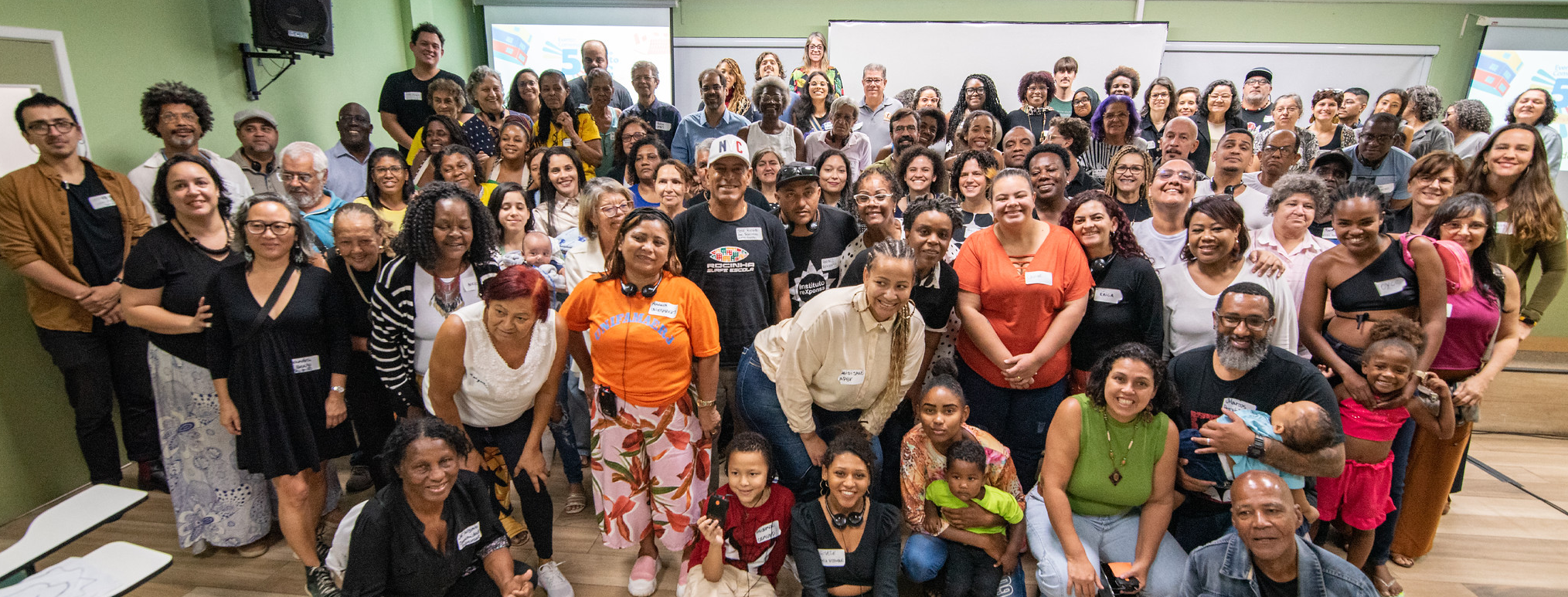
Clique aqui para Português
The Favela Community Land Trust Project* marked its fifth anniversary in 2023, having grown as a model for ensuring stability and security of tenure in self-managed communities. The milestone was celebrated during a seminar featuring national and international invited guests at the Rio de Janeiro Public Defenders Office headquarters, in the FESUDEPERJ Auditorium, on October 28.
Community Land Trusts (CLTs) serve as a model for land rights and management through community control, originating with the U.S. civil rights movement of the 1960s. In Brazil, the potential of Favela Community Land Trusts was introduced in Rio de Janeiro five years ago, an anniversary celebrated at an event on October 28, 2023. Here, the model is being used primarily to counter eviction and gentrification, guaranteeing the right to housing in favelas, housing cooperatives, traditional communities, and urban occupations by ensuring security of tenure and empowering local residents.
The basic principle of the model is self-organization through a skillful melding of collective land management with the individual freedom of residents, established by separating ownership of land from structures. The land, owned by the entire community, is maintained through a system of collective management, while the homes belong to residents individually. CLTs’ main purpose is to guarantee affordable housing by strengthening the community, ensuring security of tenure with territorial control.
The Favela Community Land Trust is a Brazilian application of the CLT, which, since the 1960s, has crossed borders, finding a home in numerous nations and diverse contexts worldwide. It was with the intention of stimulating a broad exchange of knowledge and experiences among those who, through CLTs, fight for access to dignified housing worldwide, that the Favela Community Land Trust project held its 5th Anniversary Event in late October, attended by 150 people in-person and another 500 online.
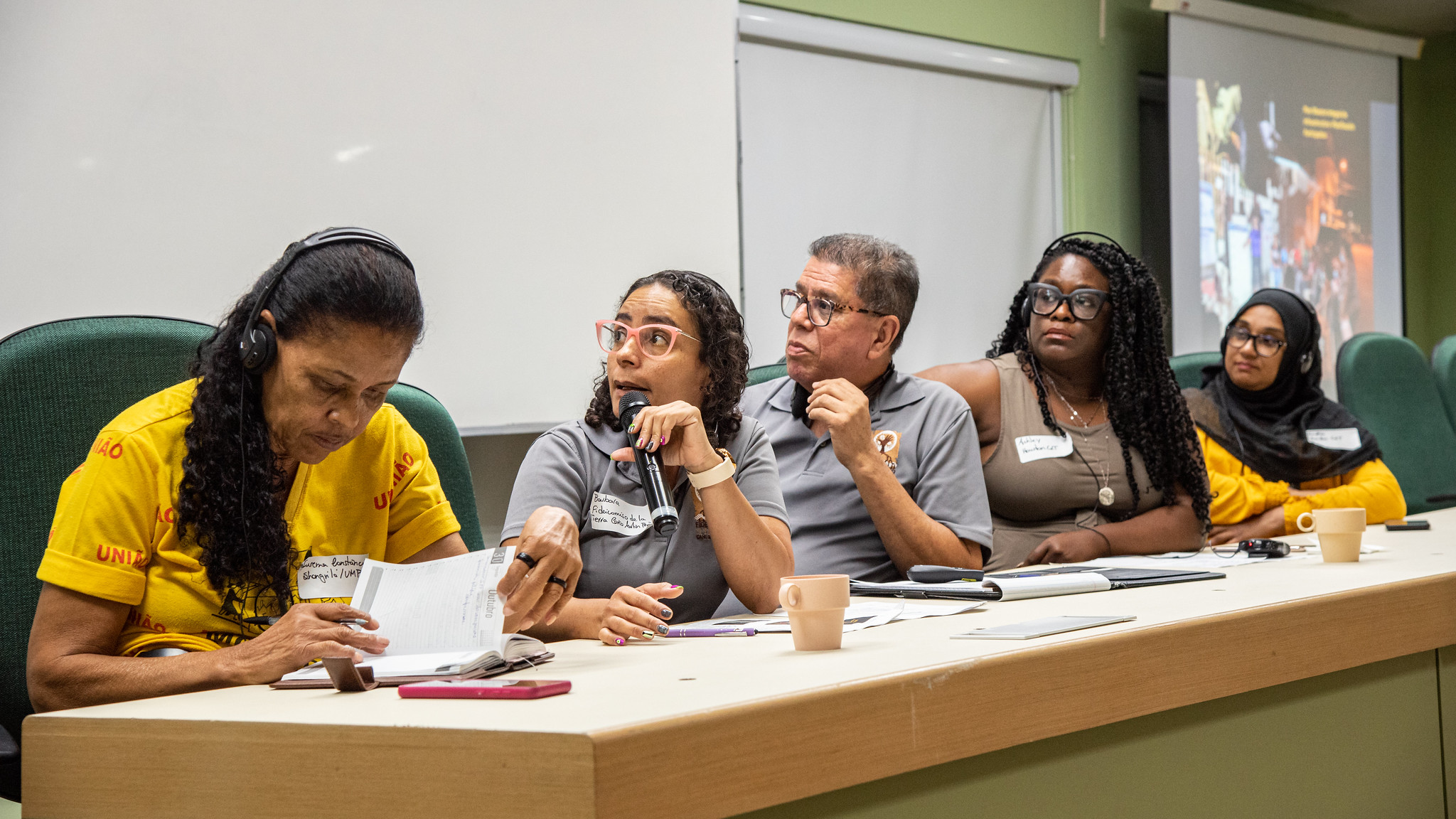
The international guests shared their vast experience, representing CLTs from three countries. They included: Ashley Allen, executive director of the Houston CLT in the US; Razia Khanom, vice-president of the London CLT in the United Kingdom; and Mario Nuñez and Barbara de Jesús, executive director and community leader, respectively, of the Fideicomiso de la Tierra Caño Martín Peña. Located in San Juan, Puerto Rico, this was the first CLT in an informal settlement in Latin America and served as a direct inspiration for the Brazilian Favela-CLT movement.
Representatives from pilot CLT experiences in Brazil were also present, including: Jurema Constâncio, from the Shangri-Lá Housing Cooperative in Taquara, in Rio’s West Zone, and member of the National Union for Popular Housing (UNMP); Neide Mattos, from Grupo Esperança, in Colônia Juliano Moreira, in Jacarepaguá, also in the West Zone; and Paulo Roberto da Silva Machado, president of the Trapicheiros Residents Association, in Tijuca, located in the North Zone.
The event featured group activities and reflections on the CLT and its practical applications in favelas, in addition to the thematic panels with national and international guests. The first panel, “The Right to Land and Housing through the CLT” discussed the challenges of land access and the realization of housing rights in cities. The second panel, “Community Organizing in CLTs” delved into strengthening communities through CLTs and strategies for engagement and democratic control of land. The panel “South-South Dialogues: Opportunities and Challenges for CLTs in Latin America” specifically explored the potential application of CLT strategies to favelas and urban communities across Latin America.
Theresa Williamson, urban planner and executive director of Catalytic Communities,* opened the event by providing context on how the proposal for Favela-CLTs emerged in Rio: as a tool of resistance and policy formulation in a city where mega-events triggered significant waves of both forced evictions and gentrification in favelas.
“The idea of the Favela0CLT, though it didn’t have that name at the time, originated from the concept of Community Land Trusts abroad. We began discussing it as a theoretical proposition in the context of meetings [in Vidigal, to combat gentrification]. The idea [of transforming favelas into CLTs] lingered like a dream, something distant. Little did we know it had already been done in favelas in Puerto Rico. It was something we found out after the Olympics and that’s why we’re here today. From that small seed planted in Vidigal in 2014… we had been researching with foreign volunteers, and one of them said, ‘did you know there’s already a CLT in Puerto Rico? In their favelas?’ And that’s where it all started.” — Theresa Williamson
She concluded her talk stating that the Caño Martín Peña CLT, in Puerto Rico, became the inspiration for the Favela-CLT in Brazil. Two years later, in 2018, after connecting and learning more, a series of workshops were held with their new Puerto Rican partners to introduce Favela-CLTs in Brazil.
Following the opening talk, a retrospective video (with English subtitles) recapped the most important events of the first five years of the Favela-CLT Project:
After the video, Tarcyla Fidalgo, lawyer, urban planner and coordinator of the Favela-CLT project, introduced the international guests for the first panel: Ashley Allen, Razia Khanom, and Mario Nuñez and Barbara de Jesús. The session sought to share insights from global CLT leaders with Brazilians who are working to implement the model on Brazilian soil, offering a comprehensive overview of challenges of access to urban land and the guarantee of housing rights.

Nuñez, from Puerto Rico’s Favela-CLT, emphasized the centrality of resident agency in his talk.
“Who better than the residents to identify their problems and seek solutions with support from specialists? In the 1970s and 1980s, there was a policy in Puerto Rico to eradicate informal settlements, greatly affecting the communities of the Caño Martín Peña… One of the key elements [in our CLT today] are the community-led evaluations… The law establishes that communities that organize their CLTs have active participation; it is integral to the process. [When we founded the CLT] training workshops allowed residents and leaders to evaluate all possibilities for land ownership in Puerto Rico… We discussed the CLT model in these workshops, and that’s how the idea came about. CLTs adapt and shape themselves to the particularities of each territory.” — Mario Nuñez
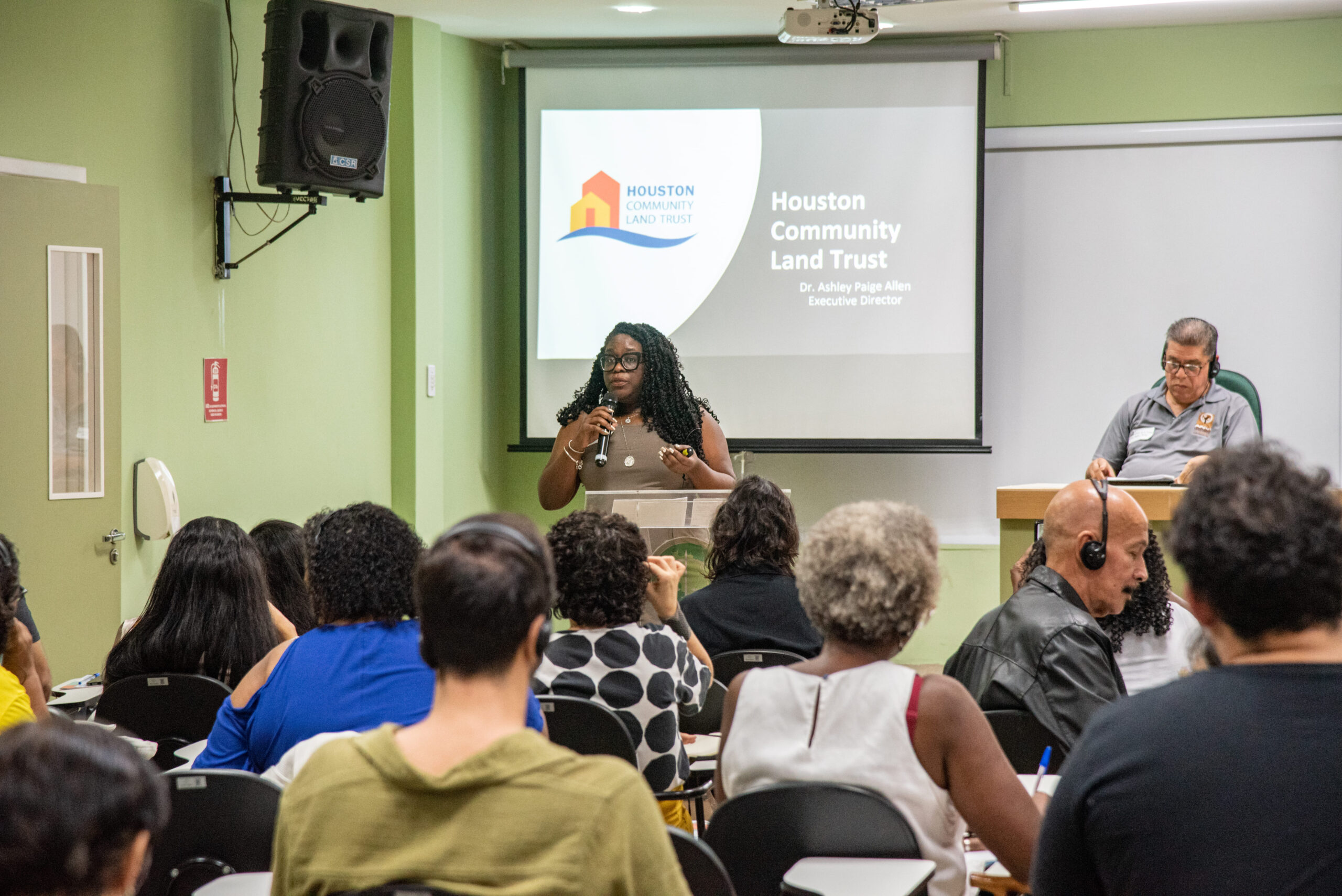
Next, Allen shared her experience building the Houston CLT, providing a historical overview of the territorial situation in Houston. She explained that housing costs surged alongside extreme weather events, especially hurricanes, and that this was compounded by the forces of gentrification and real estate speculation. Prices, once accessible, have become prohibitive.
“We are a very new CLT; we began in 2018. We had to make some adaptations, but we came to realize, over time, that we had to convince the city of Houston that we needed to guarantee a better quality of life [for socially vulnerable populations], to ensure that people’s needs are met… Our CLT works with you buying a house, [like] in the community where you grew up and that you don’t want to leave… The land continues to exist [safe from speculation] and you, as the owner of that house, can make improvements.” — Ashley Allen
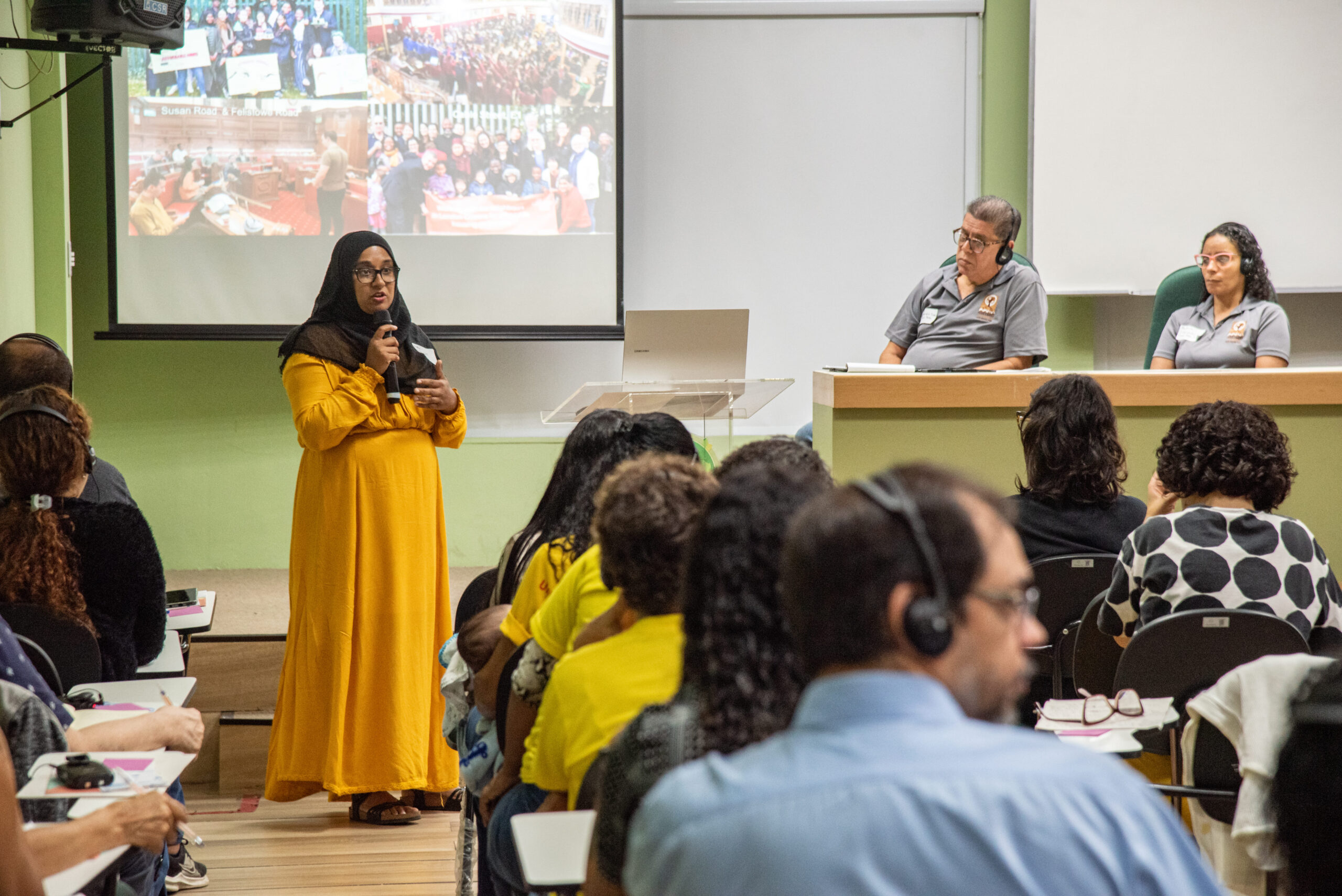
Khanom noted that in London, average workers, such as teachers, nurses, and even doctors, can no longer live in the city. Some spend over 50% of their salaries on rent. This is largely due to the intense real estate speculation that unfolded in the 1980s, driving housing prices to exorbitant levels.
“The London CLT works for people who have good salaries, but that, because of inflation, are not able to buy a house… We do not have a model that supports social rent or that helps people buy, because there is no funding.” — Razia Khanom
After this initial session, event participants were invited to share the points they found interesting and ask questions about the first panel. The morning session concluded with Fidalgo providing an overview of how the Favela-CLT project operates in Brazil, particularly in pilot communities.
“You’ll notice that all these models—from Puerto Rico, the US, the UK, and Brazil—differ because needs vary in each place, each community. As we debate with local pilot communities, present here today, even within Rio de Janeiro, the CLT takes on a distinct form in each community, and that’s very important… The Favela-CLT is a model adapted to Brazilian needs. And what does this mean? You’ve seen photos of CLT developments in the US and Europe that showcase homes that correspond to an upper-middle class lifestyle for us here in Brazil. But that’s not the focus of CLTs here. Here, as in Puerto Rico, our emphasis is on informal settlements, favelas, informal subdivisions and self-built housing… on the groups that build their homes through collective action.” — Tarcyla Fidalgo
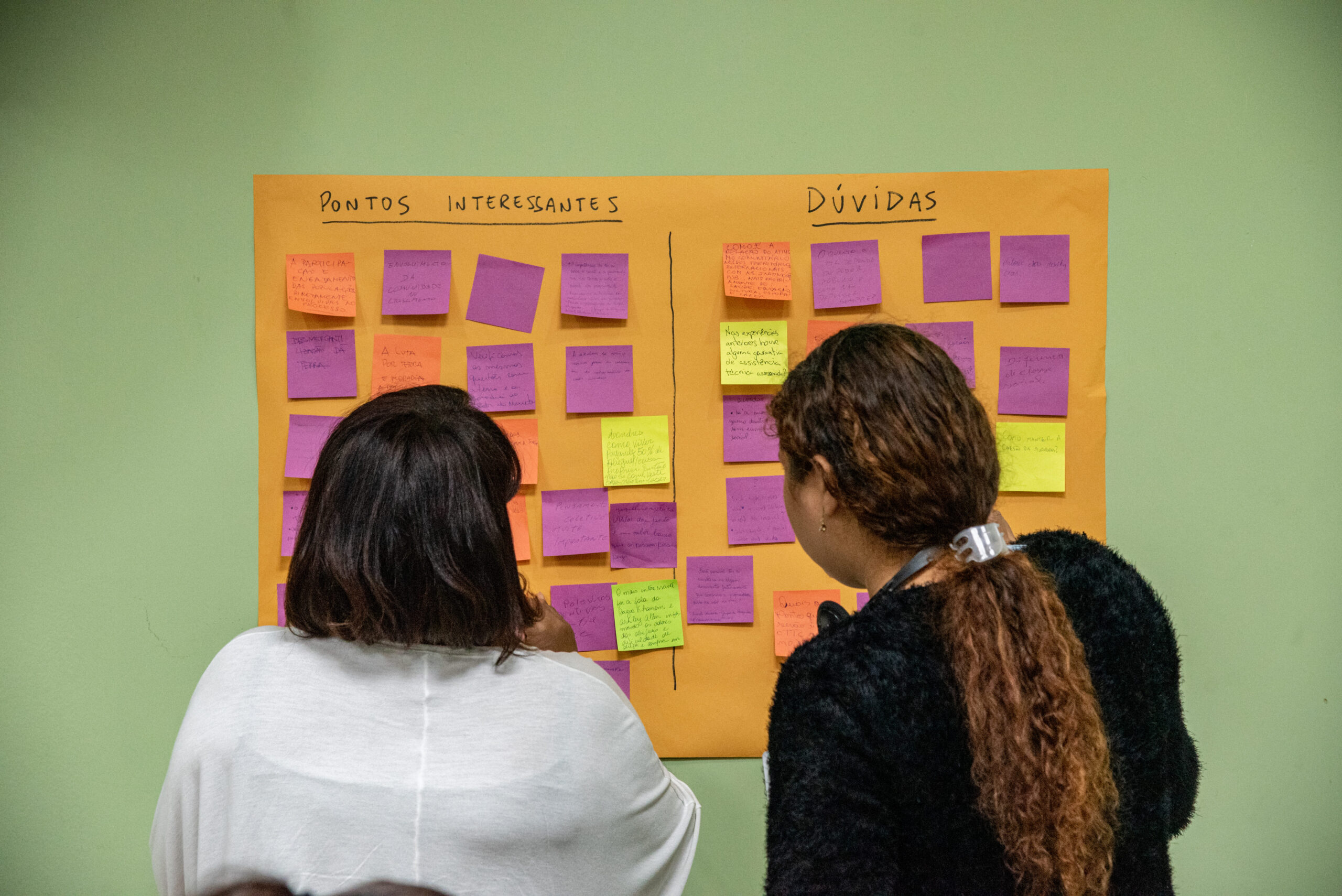
After Fidalgo spoke, a round of questions was opened so attendees could engage in conversation with the international guests. The morning session then came to an end. An agroecological meal was served by the Serra da Misericórdia Integration Center (CEM), which operates in Terra Prometida, the most recent pilot community to join the Favela-CLT project, based in Complexo da Penha.
The next session, titled “Community Organizing in CLTs,” held a discussion on community empowerment in CLTs, engagement strategies and democratic control of land. Alongside the international guests, this second panel featured Jurema Constânico, member of the National Union for Popular Housing (UNMP) and community leader at the Shangri-Lá Cooperative, a Favela-CLT pilot community in Brazil and Rio’s first housing cooperative.
“I live in the Shangri-Lá Cooperative, the first working-class housing cooperative in the state of Rio de Janeiro. From the moment we discovered the CLT, after participating in several events, we got interested and went looking for more information about collective property. Initially, we believed that, having lived on that plot for years and being a cooperative, we had legal assurances. But we were mistaken. We needed exactly this process [of the CLT] to formalize our collective ownership of the land.” — Jurema Constâncio
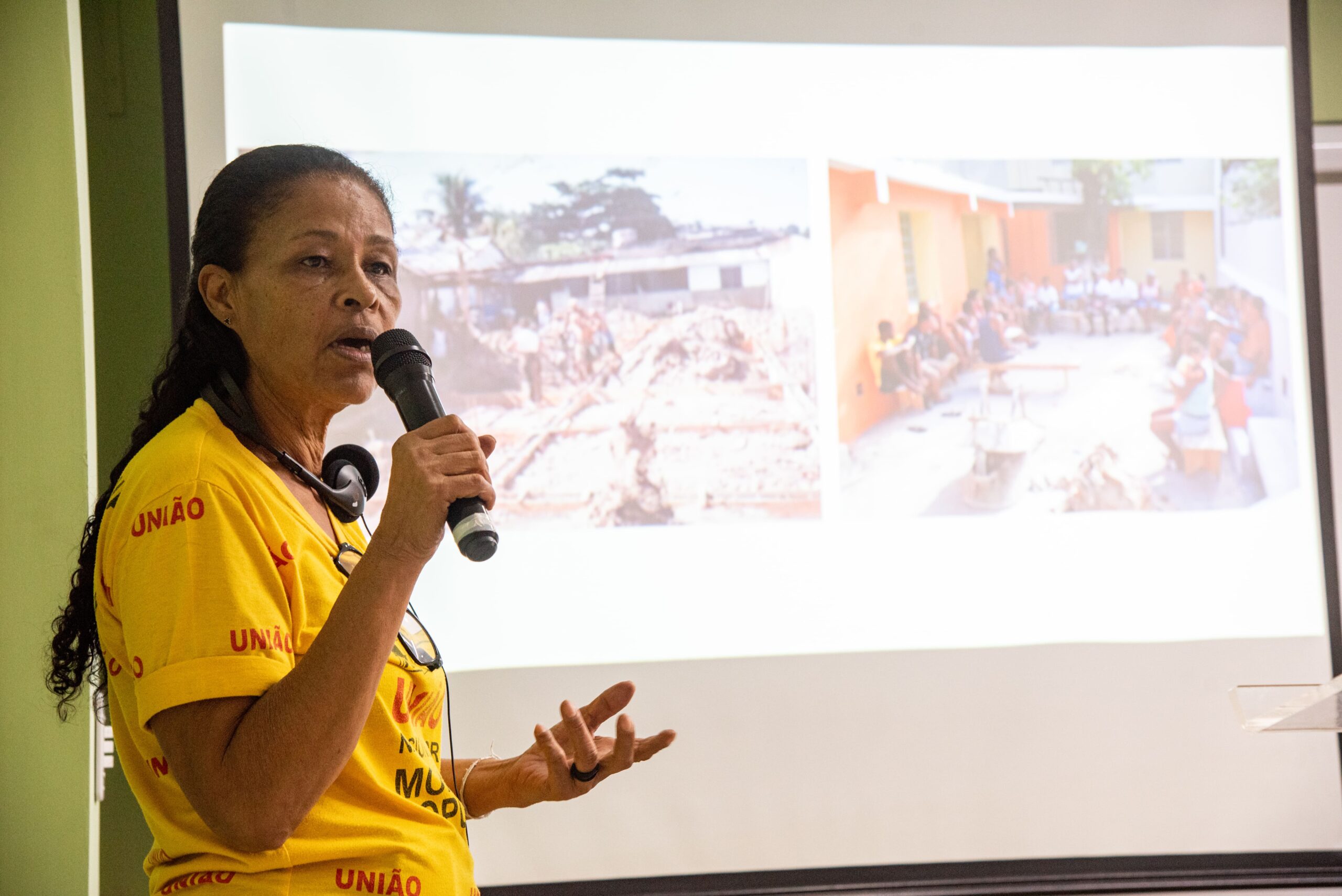
The panel continued with participants highlighting their strategies for mobilizing their communities to participate in the CLT. An exchange of experiences unfolded between panelists and the audience. Closing the event, a discussion on “South-South Dialogues: Opportunities and Challenges for CLTs in Latin America” brought forth reflections on the possibility of applying the CLT system to favelas and urban communities throughout Latin America. The panel included Nuñez, de Jesús, and Constâncio, as well as Neide Mattos from Grupo Esperança in Colônia Juliano Moreira, Jacarepaguá, and Paulo Roberto da Silva Machado, president of the Trapicheiros Residents’ Association in Tijuca.
“Through this third CLT seminar, we’ve exchanged knowledge and experiences and, in our case representing Puerto Rico, we see that it’s an alternative and a viable option for Brazil… but in Brazil, it’s crucial to evaluate how the CLT option will be implemented… Oftentimes, knowledge is power and if residents know and understand the model of collective land ownership, it can be an important option to ensure the security of tenure for our urban settlements.” — Mario Nuñez
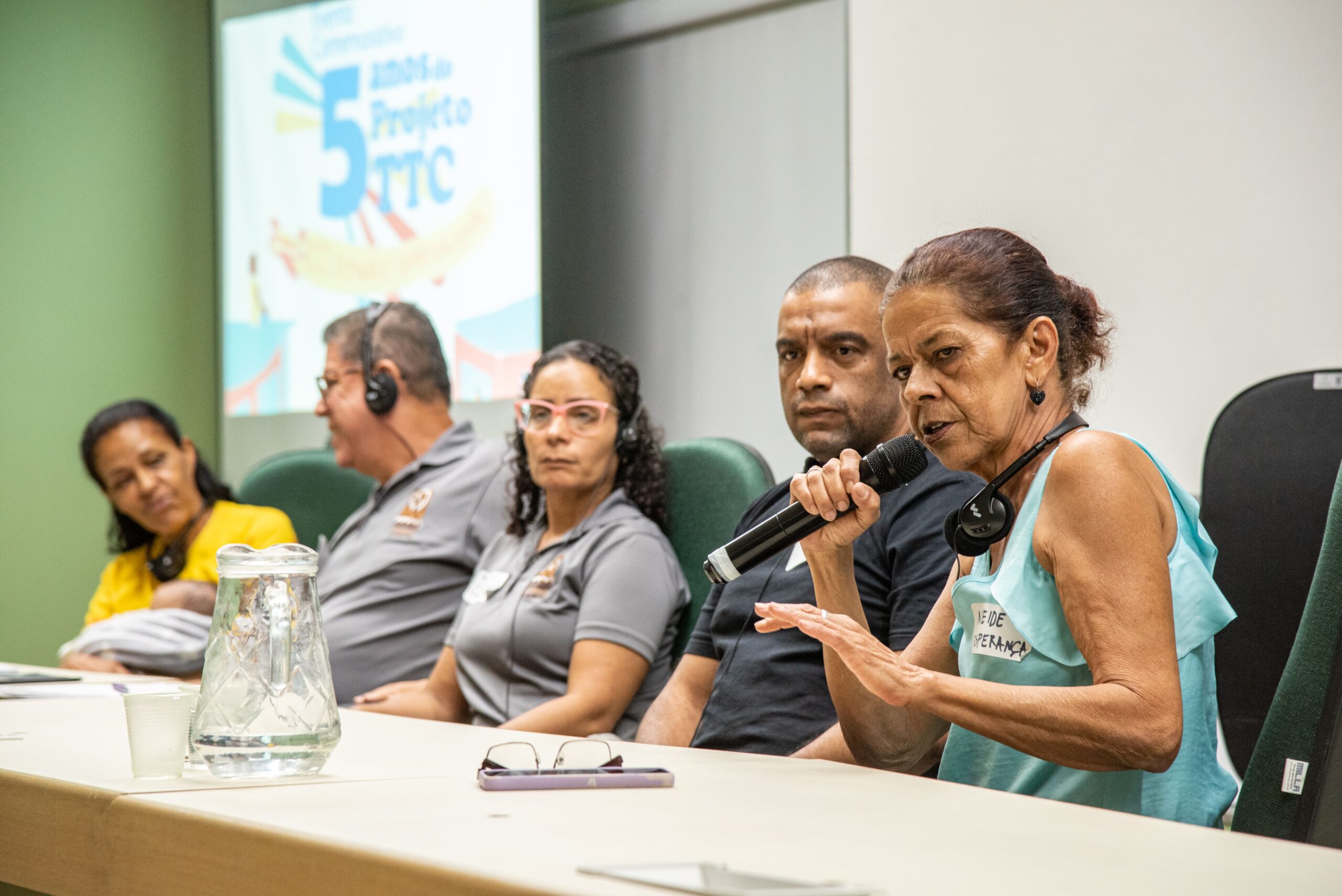
Mattos wrapped up the discussion with poignant reflections on the history of Grupo Esperança, of which she is a part. Her community saw the necessity of organizing themselves to establish a CLT that could help with land regularization, minimizing the risk of future evictions and the loss of their homes.
“The big issue [in our community] was that, after a resident gets their house, they close the door and throw away the key. They already got what they wanted, which was the house, and [think that] they’re fine, safe, well. They think they don’t have anything to worry about. They’ve got their house, what else do they have to get involved with? We learned about the CLT during the pandemic. [At the time,] I wanted to understand what the Community Land Trust was… the CLT project arrived in Grupo Esperança to [help us] organize, restructure, and keep us on our land.” — Neide Mattos
At the end, all the day’s guests were invited to the table for a collective greeting, marking the conclusion of the event.
CLTs vary from community to community, country to country. But the need for resident engagement in the construction and maintenance of each CLT is certain. Housing is a human right, but as revealed by national and international guests, there is a significant difficulty in assuring this right across the world. We perceive a severe global housing crisis. But if the problem is collective, the solution is also collective. In this scenario, the CLT can be a tool for organizing and inspiring necessary alternatives.
Watch the Complete Video of the 5th Anniversary of the Favela Community Land Trust Project Here (in Portuguese, without subtitles):
Check out the photo gallery below or view the event album on Flickr:
About the author: Bárbara Dias was born and raised in Bangu, in Rio’s West Zone. She has a degree in Biological Sciences, a master’s in Environmental Education, and has been a public school teacher since 2006. She is a photojournalist and also works with documentary photography. She is a popular communicator for Núcleo Piratininga de Comunicação (NPC) and co-founder of Coletivo Fotoguerrilha.
*The Favela Community Land Trust (F-CLT) and RioOnWatch are both projects of Rio de Janeiro-based NGO Catalytic Communities (CatComm).

